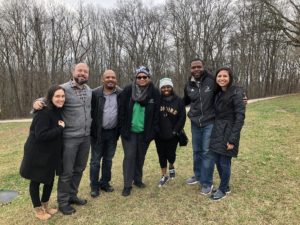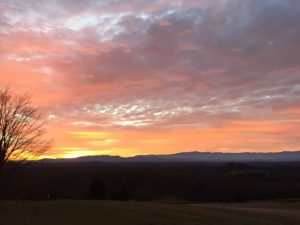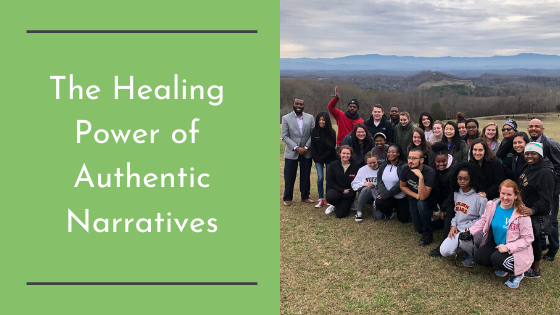This week’s blog is written by Natalia Valenzuela Swanson, Program Director Healthy Eating | Active Living, Mary Black Foundation
The Power of Authentic Personal Narratives
Last month, Spartanburg had the honor of welcoming Dr. Gail Christopher as the keynote speaker at the Martin Luther King, Jr. Unity Celebration. While at the W.K. Kellogg Foundation, Dr. Christopher envisioned and led the Truth, Racial Healing and Transformation efforts across the United States. While in Spartanburg, Dr. Christopher was engaged in various conversations and spoke of the power of authentic, personal narratives in bringing people to a new understanding of one another in community. This message of sharing authentic narratives and of “expanding our circles of human compassion and human understanding” became a reality for those of us who made the trip to the Highlander Center.
 Dr. Alysa Handelsman and James Stukes co-led a Wofford Winter Interim class, Grassroots Organizing and Social Justice: Applying Anthropology Here & Now, that included time at the Highlander Center. They invited five representatives from the community to join the class to learn together with the students, as well as share about our work and experiences. This group included Wanda Cheeks from the City of Spartanburg Parks & Recreation, Marquice Clark from the Cleveland Academy of Leadership, Jessica Holcomb from the Spartanburg Housing authority, Tony Thomas from the Northside Development Group, and myself from the Foundation.
Dr. Alysa Handelsman and James Stukes co-led a Wofford Winter Interim class, Grassroots Organizing and Social Justice: Applying Anthropology Here & Now, that included time at the Highlander Center. They invited five representatives from the community to join the class to learn together with the students, as well as share about our work and experiences. This group included Wanda Cheeks from the City of Spartanburg Parks & Recreation, Marquice Clark from the Cleveland Academy of Leadership, Jessica Holcomb from the Spartanburg Housing authority, Tony Thomas from the Northside Development Group, and myself from the Foundation.
Telling of Untold Stories
Our time at the Highlander Center was facilitated by Co-Director Rev. Allyn Maxfield-Steele, a graduate of Wofford College and Vanderbilt Divinity School. We learned that change happens with the telling of untold stories. We learned about different forms of social organizing, exercises that included mapping out Spartanburg to talk about trends and opportunities for action, as well as music and songs that have been part of cultural organizing movements. Our time also included time to hear. We heard from the students about the projects they were designing and provided feedback. In addition, we spent a good deal of time hearing each other’s personal stories.
 Perhaps the most powerful part of the three days together was the “fishbowl.” Rev. Maxfield-Steele had challenged the group earlier during our visit with the question, “Are we fiercely brave to share stories?” The five of us who were community participants sat in the middle of the room with everyone else surrounding us in a larger circle and observing. Our instructions were to begin a dialogue amongst ourselves on why we do the work that we do, and to tie that back to our stories. We spent close to three hours in dialogue together, sharing our authentic stories, hearing each other, and through that time, “expanding our circles of human compassion.” It truly was powerful.
Perhaps the most powerful part of the three days together was the “fishbowl.” Rev. Maxfield-Steele had challenged the group earlier during our visit with the question, “Are we fiercely brave to share stories?” The five of us who were community participants sat in the middle of the room with everyone else surrounding us in a larger circle and observing. Our instructions were to begin a dialogue amongst ourselves on why we do the work that we do, and to tie that back to our stories. We spent close to three hours in dialogue together, sharing our authentic stories, hearing each other, and through that time, “expanding our circles of human compassion.” It truly was powerful.
Reflections
In Wanda Cheeks’ own words,
“My personal take away from the Highlander is the impact of the fishbowl method – in teaching and learning. When I returned, I viewed everything completely different… I have a shared vision of our community and how to be more inclusive.”
This is the power of stories and of connection.
“My experience at the Highlander Center revealed to me the importance of ‘proximity’ and how the barriers, that seem insurmountable at times, can be overcome through listening, empathizing, and sharing personal experiences – all of which when done in earnest, leads to better outcomes,”
reflected Tony Thomas. This is work of the heart. As Dr. Christopher also said, “It’s not enough to simply understand the data; we must also understand the heart to do work that would put others before us.”

